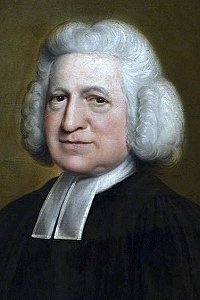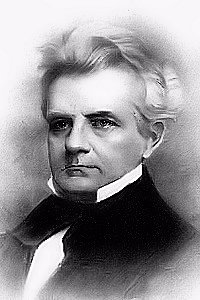Introduction

Words: Charles Wesley, Hymns and Sacred Poems 1749.
Music: Meribah Lowell Mason, 1839 (🔊 pdf nwc).

The Son of Man coming in the clouds with great power and glory.
Mark 13:26

Words: Charles Wesley, Hymns and Sacred Poems 1749.
Music: Meribah Lowell Mason, 1839 (🔊 pdf nwc).

This is certainly one of the grandest, most perfect, and most poetical of all Charles Wesley’s hymns. Tradition says that the imagery of the second stanza was suggested by a visit to Land’s End, England. This cannot now be verified. All we can say with certainty is that the hymn was written not long after a visit to that famous spot.
Standing on Land’s End, with the broad English Channel on the one hand and the wide Atlantic on the other, may have reminded him of the thought, which is older than his time and has been used by more than one author. Addison says (Spectator, No. 590):
Many witty authors compare the present time to an isthmus or narrow neck of land that rises in the midst of an ocean immeasurably diffused on either side of it.Nutter, p. 392
Thou God of glorious majesty,
To Thee, against myself, to Thee,
A worm of earth, I cry;
A half-awakened child of man;
An heir of endless bliss or pain;
A sinner born to die!
Lo! on a narrow neck of land,
’Twixt two unbounded seas I stand,
Secure, insensible;
A point of time, a moment’s space,
Removes me to that heavenly place,
Or shuts me up in hell.
O God, mine inmost soul convert!
And deeply on my thoughtful heart
Eternal things impress:
Give me to feel their solemn weight,
And tremble on the brink of fate,
And wake to righteousness.
Before me place, in dread array,
The pomp of that tremendous day,
When Thou with clouds shalt come,
To judge the nations at Thy bar;
And tell me, Lord, shall I be there
To meet a joyful doom?
Be this my one great business here,
With serious industry and fear
Eternal bliss to ensure;
Thine utmost counsel to fulfill,
And suffer all Thy righteous will,
And to the end endure.
Then, Savior, then my soul receive,
Transported from this vale to live
And reign with Thee above;
Where faith is sweetly lost in sight,
And hope in full supreme delight,
And everlasting love.